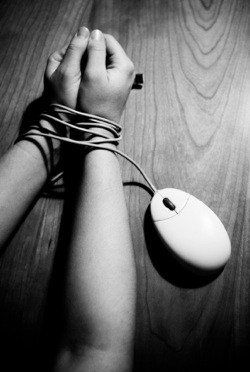A magazine where the digital world meets the real world.
On the web
- Home
- Browse by date
- Browse by topic
- Enter the maze
- Follow our blog
- Follow us on Twitter
- Resources for teachers
- Subscribe
In print
What is cs4fn?
- About us
- Contact us
- Partners
- Privacy and cookies
- Copyright and contributions
- Links to other fun sites
- Complete our questionnaire, give us feedback
Search:
The online fix

Between sending emails, sorting out your social life, slobbing out watching YouTube and meandering down a crooked and endless path of links, it's possible to while away hours online. Is it possible, though, to be addicted to the Internet? If you've ever watched an entire day go by in front of a screen you may have wondered whether it is. Courtesy of the excellent blog Mind Hacks, we've got some good news and bad news for you on that front. The good news is that Internet addiction doesn't seem to be real, but the bad news is that there are good psychological reasons for why the internet can be so distracting. Here's the lowdown.
In the decade since the Internet went mainstream, there has been a certain amount of worry that people could become addicted to its electronic charms. Media reports tell stories of people who've dropped out or lost their jobs from spending all their time online, and American psychologists have even considered adding 'Internet addiction' to their official list of mental disorders. Fortunately, all that talk doesn't add up to a real condition. A recent roundup of all the studies ever conducted on Internet addiction finds that there's never been any good evidence for its existence.
Part of the problem lies in how some people define an addiction. If you consider yourself addicted to something if you spend lots of time doing it, suffer negative consequences from doing it, but also harm when you don't, then you'd be 'addicted' to lots of things. Like school, for example, or eating. It's true that some people do use the Internet so much that the rest of their lives falls apart, but blaming the Internet for it doesn't work. It's just as easy to spend all your time reading books or building model boats. All those things can certainly eat up your life if you let them, but that's not the same as being addicted.

All the same, the Internet is a great distraction. It’s easy to get away from doing difficult work (like, say, writing an article) by checking email, seeing what friends are up to on Facebook, or watching a video online. That ease is part of the problem. When you’re already working on your computer, the entire rest of the Internet is right there. It takes a mere few clicks to switch between your work and some funny cats. What’s more, online content tends to be short. You probably wouldn’t stop writing to watch an entire episode of a television show – half an hour is a big break to take just on impulse – but what’s the harm in stopping for a few minutes to watch something on YouTube? The cost in effort and time seems to be low, but the benefit of watching the funny cats is huge. You get to watch funny cats!
A classic approach to changing that distracting behaviour might be to change the cost/benefit ratio. If it weren’t so easy to get to the rest of the distracting stuff online, we might get more done. So perhaps someone could design a browser with a ‘work’ mode, where distracting sites were blocked. If you had to go through the trouble of turning off the work mode you probably wouldn’t do it quite so often.
There’s another interesting psychological principle that might be helping distract us, particularly in email checking. Do you ever find yourself checking your email so often it’s almost compulsive? There’s virtually no chance that someone will have emailed you in the time since you last checked it, but still…why not check just in case? It turns out that one of the best ways to train an animal (or, indeed a person – we’re animals too after all) is not to reward it every time it performs a particular action. It’s to reward it randomly when it performs the action. If there’s no way to predict whether it will get a reward or not, there’s no reason to ever stop performing the action. The reward could come at any time. If you think of an email as the reward, you can see why the lure of email checking can be so strong. Most times when you check your email there won’t be anything, but sometimes – at random times – there is! That tickles the reward centres of our brain, and we learn to do it more, in the hope of more rewards.
If someone ever tells you they think you’re addicted to the Internet, now you can reassure them that there’s never been a study that shows it’s possible. The power of the Internet to distract us is built right into the way we use it, though, so it’s good to be aware of that. Sometimes it just takes a really good amount of self-discipline to avoid the tempting distractions the Internet can offer. A good strategy might be to hold out the prospect of a reward once you’ve finished your work. Now that this article’s finished, for example, a bit of email checking and funny cats seems like just the right thing.
Cat photo taken from Aunt Owwee's Flickr photostream.


